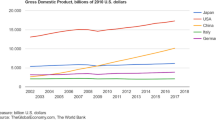Abstract
Argentina is a developing country which at present is faced with the advent of high technology and the computer age. In Argentina, like for that matter elsewhere, technology is outrunning our capability to understand it and to take full advantage of its potential.
This report describes the conditions prevailing in Argentina to assess the potential impact of high technology in education. Recommendations to implement a program of technology transfer in a typical developing country are drawn. In addition, some of the shortcomings of computer education in Argentina as well as in the United States are indicated.
Similar content being viewed by others
Bibliography
J. N. Behrman and W. A. Fischer.Science and Technology for Development, Cambridge, Mass, Oelgeschlager, Gunn and Hain (1980).
A. Bork,Learning With Computers, Bedford, Mass., Digital Press (1981).
R. A. Canueto, “The Impact of Computer Technology on Education”, California State University, Sacramento, Department of Management, Class Project in Research Methodology, Spring 1983.
The Carnegie Commission on Higher Education.The Fourth Revolution: Instructional Technology in Higher Education: Report and Recommendations. New York, McGraw Hill, 1972.
R. E. Driscoll and H. W. Wallender III,Technology Transfer and Development: An Historical and Geographical Perspective, Fund for Multinational Management Education and the Council of the Americas, New York, (1974).
C.C.S.I. Clerici a M. C. Rampazzi, Modelo para la ensenanza de la programacion (A model used to teach programming), Buenos Aires, Argentina, Universidad de de Belgrano, Faculty of Ingineering, 1983. (In Spanish).
Robert Gagne, ulLas Condiciones del Aprendizaje, Buenos Aires, Ed. Aguilar, 1970. (In Spanish).
R. Gagne,Principios Basicos para el Aprendizaje para la Instruccion, Mexico. Ed. Diana, 1975. (In Spanish).
R. M. Gagne and L. J. Briggs,La Planificacion de la Ensenanza, Mexico, DF, Trillas. 1976 (In Spanish).
A. Luehrmann, A prepared statement on research, development and planning for computers and the learning society. Hearings before the Subcommittee on Domestic and International Scientific Planning, Analysis and Cooperation, of the Committee on Science and Technology, U.S. House of Representatives, 95th Congress, First Session, October 1977 (No. 47), Washington, D.C. U.S. Government Printing office, 1978, pp. 548–569. Reprinted in Robert P. Taylor (ed.)The Computer in the School: Tutor,Tool,Tutee, New York and London, Teachers College Press, 1980.
Mini Computer. Tres Articulos sobre la Aplicacion de Micro-computadoras en la Educacion, Ano.2, No.2, May 1983, pp 18–20, 22–24, 26–28, Buenos Aires, Argentina. (In Spanish).
La Nacion,Europe Faces the Innovation Challenge, Buenos Aires, Argentina, July 24, 1983. 3er. Section p. 1, 5.
National Commission on Excellence in Education,A Nation at Risk: The Imperative for Educational Reform, U.S. Department of Education, Washington, D.C. 20208, 1983.
A. G. Oettinger,Run, Computer, Run: The Mythology of Educational Innovation. Cambridge, Mass., Harvard, 1979.
Seymour Papert,Mindstorms: Children,Computers and Powerful Ideas, New York, Basic Books, 1980.
E. Passarello, Informatica: Politicas y Estrategias para el Desarrollo.Tecnologia Informatica, I, 9, Oct. 1982.a.
E. Passarello, Sistemas Humanos y Estructuras del Conocimiento,Tecnologia Informatica, I, 9, Oct. 1982b.
W. de Padua Paula Filho and H. Pacca Loureiro Luna, Social Impact of Automation: Some Specific Problems of LDCs,Human Systems Management, 3 (1982) pp 311–316.
D. W. Pearce (Ed.)Dictionary of Modern Economics, Cambridge, Mass., MIT, 1981.
A. Portela, A. Guerrero, O. G. Povina and P.C. Nurua,Ciencia Tecnologia, Industria y Educacion, Buenos Aires, Fraterna, 1982, (in Spanish).
O. Gomez Povina, Fundacion Banco de Boston,Personal Communication, Buenos Aires, Argentina, July 25, 1983.
J. L. Roces, Consejo Nacional de Educacion Tecnical, Ministerio de Educacion, Buenos Aires, Argentina,Personal Communication, July 23, 1983.
Federick Rudolph,The American College and University: A History,Vintage Books, Alfred Knopf, 1962.
M. C. Rampazzi, “El Uso de un medio no convencional; Su Inforporacion a la ensenanza”. (The Use of Non-Conventional Teaching Method). Buenos Aires, Argentina, Universidad de Belgrano Faculty of Engineering, Report No. 02-78, 1978. (In Spanish).
Horacio C. Reggini,Alas para la Mente, Buenos Aires, Ediciones Galapagos, Dist. EMECE, 1982. (In Spanish).
Sherman Gee,Technology Transfer, Innovation and International Competitiveness, New York, Wiley 1981.
P. Suppes, The Future of Computers in Education. A statement prepared for Computers and the Learning Society, Hearings for the Subcommittee on Domestic and Domestic and International Scientific Planning, Analysis and Cooperation of the Committee on Science and Technology, op. cit.
P. Suppes, Impact of Computers on Curriculum in the School and Universities, in R.P.Taylor (ed.).The Computer in the School, Tutor, Tool, Tutee, op. cit.
R.P.Taylor (ed.)The Computer in the School, Tutor, Tool, Tutee, New York and London, Teachers College Press, 1980.
Author information
Authors and Affiliations
Rights and permissions
About this article
Cite this article
van Gigch, J.P. High technology transfer and computer education: Lessons drawn from the case of a developing country. J Technol Transfer 8, 57–68 (1984). https://doi.org/10.1007/BF02175646
Issue Date:
DOI: https://doi.org/10.1007/BF02175646




